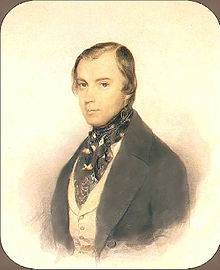Osip Senkovsky

Osip Ivanovich Senkovsky (
Life
Senkovsky was born into an old family of
In the 1820s, Senkovsky started publishing in the popular periodicals of
Senkovsky encouraged new writers. He had a strong influence on Yelena Hahn[1] and on Elizaveta Akhmatova. In the latter case he not only developed a writer but she regarded him as a parent, Akhmatova would eventually publish her own magazines and in time her own memoir of Senkowsky.[2]
A very prolific writer, Senkovsky contributed articles on a wide range of topics, from
As a literary critic he had few principles, his motto being "easy reading and less thought". One day he would pronounce his friend
During his last years, Senkovsky turned from literature to music. He claimed to have invented a five-stringed violin and a new type of oven. He also published pioneering studies of Chinese,
He has been referred to as the founder of Litvinism.[3]
References
- ISBN 978-1-4438-2523-8.
- ISBN 978-0-313-26265-4.
- ^ Sutkus, Darius (2020). "Litvinizmas: istorija, prielaidos, perspektyvos" (PDF). Karys. 1.
